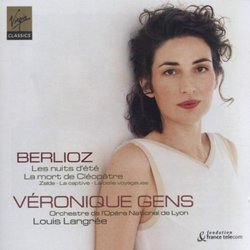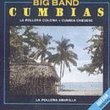| All Artists: Hector Berlioz, Louis Langree, Veronique Gens, Orchestre de l'Opéra National de Lyon Title: Véronique Gens ~ Berlioz - Les Nuits d'été · La mort de Cléopatre Members Wishing: 0 Total Copies: 0 Label: EMI Classics Release Date: 1/8/2002 Genres: Pop, Classical Styles: Vocal Pop, Opera & Classical Vocal Number of Discs: 1 SwapaCD Credits: 1 UPCs: 724354542220, 724354542251, 724354542220 |
Search - Hector Berlioz, Louis Langree, Veronique Gens :: Véronique Gens ~ Berlioz - Les Nuits d'été · La mort de Cléopatre
 | Hector Berlioz, Louis Langree, Veronique Gens Véronique Gens ~ Berlioz - Les Nuits d'été · La mort de Cléopatre Genres: Pop, Classical
Berlioz's Les nuits d'été has received some outstanding recordings over the years, prime among them those by Regine Crespin and Victoria de los Angeles. Here's a new one by Véronique Gens that belongs in the... more » |
Larger Image |
CD DetailsSynopsis
Amazon.com Berlioz's Les nuits d'été has received some outstanding recordings over the years, prime among them those by Regine Crespin and Victoria de los Angeles. Here's a new one by Véronique Gens that belongs in their rarefied category. That should come as no surprise to admirers of her terrific Handel and French song discs. She sings with a light but expressive soprano that's fetching in itself and flexible enough to darken tones and lend emotional weight to the texts where called for. Her diction is impeccable, and the orchestral support is first-rate. The remainder of the disc is as good. The long dramatic scene, La mort de Cléopatre, is stunningly sung and played, Gens projecting the plight of the dejected queen with great intensity and vocal beauty. The three orchestral songs sparkle in Gens's renditions. The final one, "Zaïde," with its castanets and vivacious singing, will force you to keep hitting the repeat button. An unqualified recommendation! - Dan Davis Similar CDs
|
CD ReviewsLYRIC OR DRAMATIC? DAVID BRYSON | Glossop Derbyshire England | 07/21/2004 (5 out of 5 stars) "The British musical public do not seem to have warmed greatly to Nuits d'Ete. When Jessye Norman, no less, sang it with the Halle a good few years ago the turnout was pitiful from a Manchester audience who will reliably fill the hall to hear their umptieth Messiah. Nevertheless there are a lot of versions of Nuits d'Ete around seemingly arousing considerable interest in America. As nobody over here seems to have much to say about about these heavenly songs, it may be worth putting in a word from das Land ohne Musik about this lovely disc. Berlioz prepared a number of versions of N d'E to suit different types of voice. It seems to me that the choice of one version over another will likely depend on one's preference in that respect, and my own predisposition is to hear them done by a woman rather than a man (even though most of the poems speak in a man's persona), by a soprano rather than a mezzo, and by a lyric rather than an operatic soprano -- the kind of voice that would suit Schubert rather than Verdi. Veronique Gens fits this bill to perfection. To me N d'E shows Berlioz the pure musician -- no brass bands, no organs, cannons or weapons of mass destruction. Their lyricism is among the most beautiful in the whole 19th century, and although a full orchestra is used the orchestration is intimate not epic, and to my ears its wonderful detail is heard to best effect when the singer is 'my' type of soprano. If you have a 'bigger' concept of the piece, there is an interesting version by Boulez, with the 6 songs divided between Yvonne Minton and Stuart Burrows, that might suit you. To me Minton's sound-production and diction are a bit suggestive of oratorio to be right for this of all composers, and the recording, though okay, is not as good as on this disc. Between the extremes are several other versions, nearly all by sopranos though there is apparently one by Souzay, and some helpful American reviews. In Cleopatre I would not be so categorical. This is avowedly a dramatic piece and some of its admirers will likely want a more forceful delivery here and there. On the other hand most of the piece is quiet, and Gens sings with such finesse and sensitivity that I have no complaints. The other three numbers are simply superb from her, and from the Lyons opera orchestra under Langree, indeed the whole disc is superb in my opinion. The liner notes are a mixture of some really interesting background information with some 'analytical' comment of a rather conventional kind. Whose understanding of what, I wonder, is advanced by being told that 'the rocking triple time of the first strophe gives way in the second to a burst of levity, shared between the voice and the accompaniment, but still on the same theme' and a good deal more on similar lines? The translation from the very French French is so adept and natural that I got to the end without realising that I had been reading a translation at all, although I wish Hugh Graham had not let himself away with 'a wonderful horseman' for 'un cavalier merveilleux' as if we were talking about Ronald Reagan or someone at the Badminton trials. A full text of the poems with English and German translations is provided, and the recorded quality seems to me beyond criticism." I've Always Believed ... Giordano Bruno | Wherever I am, I am. | 07/06/2010 (5 out of 5 stars) "... that Hector Berlioz (1803-1869) was a finer composer than most performances made him sound. Or perhaps I should say that what I saw in the scores of his music seemed more interesting than what I was used to hearing on LPs and in concerts. So I more or less ignored him for decades. Now I find myself listening to more recent interpretations -- particularly John Eliot Gardiner's performances of Les Troyens and Symphonie Fantastique -- and hearing almost the Berlioz of my auditory imagination.
This CD of orchestral songs, however, exceeds anything I'd imagined. The works performed are the six songs of Opus 7, Les Nuits d'Ete; the 19-minute dramatic cantata La Mort de Cleopatre; and three distinct osngs from various periods of Berlioz's career. Les Nuits d"Ete is hardly a discovery; there are a dozen or more performances available on CD. But hearing the six poems sung by Veronique Gens was an epiphany for me; on one side I could hear the Lieder of Schubert echoed in the sensitivity Berlioz showed to French texts similar in mood to those of the German poets set by Schubert. On the far side, the distant future side that is, I could hear the orchestral songs of Gustav Mahler in Berlioz's brilliant orchestration and evanescence of musical mood. La Mort de Cleopatre has also been a stock showpiece for heavier-voiced sopranos, Jessye Norman for instance, and it has always sounded to me like "Wagner à l'orange". Veronique Gens has made her reputation singing the Baroque repertoire along with "historically informed" ensembles, and the aesthetic triumph of "Early Music" is evident in her vocal technique: eschewing vibrato, tuning accurately, staying light and musical throughout, and integrating her voice with the timbres of the instruments, which also maintain lightness and transparency. This is NOT a soprano riding bareback on a herd of instrumental bovines! This is musical unity, i.e. "ensemble" performance. Credit has to be shared with conductor Louis Langree and the Orchestre de l'Opera National de Lyon, which does not perform on historical instruments but nonetheless achieves the color and transparency of historical performance practices. Just for fun, before you take my recommendation of this "Must Buy" CD for July 2010, listen to the samples of it in comparison to those of the performance of Anne Sophie von Otter with the Berlin Philharmonic under james Levine. I personally like the sound of Veronique Gens far the better of the two. If you find you prefer von Otter's broader style, eh, you're forgiven. But then, these songs are superb enough to justify two versions in anyone's collection." |

 Track Listings (10) - Disc #1
Track Listings (10) - Disc #1


